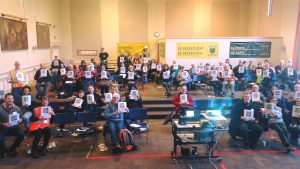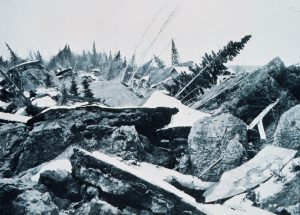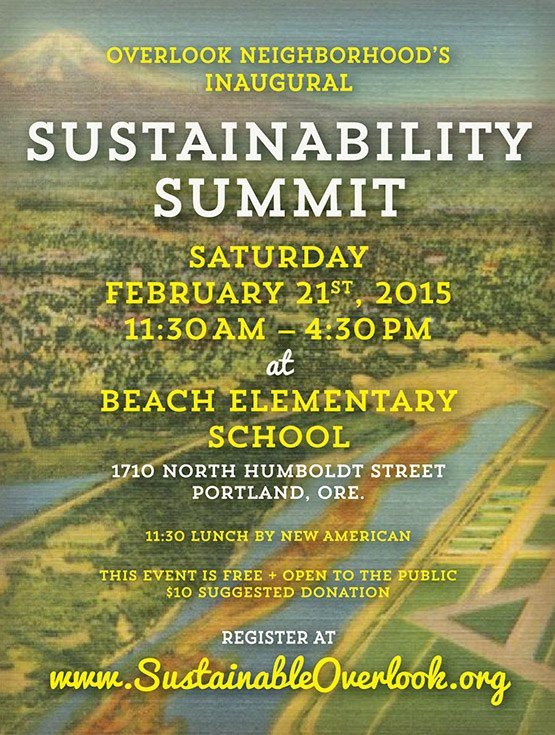Here’s one of our articles from the latest edition of Overlook Views Newsletter.
Invasive Plants in Overlook
by Mulysa Melco
Have you ever noticed ivy smothering a tree or Himalayan blackberry engulfing an alley or fence line? These are common examples of invasive species in our neighborhood. Many plant species have been brought to Portland since settlers arrived, some intentionally introduced and others that have hitchhiked by various means. While many of these new species have been ornamental or useful, some have escaped cultivation and done too well here – outcompeting the native vegetation and causing a range of ecological and economic problems.
Overlook Neighborhood was once a patchwork of oak woodland, mixed conifer forest and wetland that was home to many species of birds, pollinators and other wildlife. Our neighborhood is on the Pacific flyway, a major migratory route, so it is also in the position to provide critical sustenance to bird species passing through. As a volunteer with Friends of Overlook Bluff, a group that is working to create a nature trail around a heritage oak and restore historic oak meadow habitat, and as a landscaper designer who gets a lot of questions about dealing with invasive plants, I wanted to know more about their impact in our area. I spoke with Overlook neighbor Mitch Bixby, the Early Detection/Rapid Response (EDRR) field technician with the Portland Bureau of Environmental Services.
Mitch explains, “Invasive plants, by the definition we use, are species that change ecosystems. They’re not just “plants in the wrong place,” but species that cause ecosystems to fail in some objective, measurable ways. For example, overwhelmed ecosystems tend to have just a few kinds (or just one kind) of plant, all flowering at the same time, and then setting seed at the same time. These monocultures prevent insects and animals that depend on diversity (most of our native wildlife) from getting what they need. That’s one reason why plant diversity is so important.”
Another issue is stormwater, “We also have concerns about monoculture and infiltration. Diversity of plants leads to a variety of root systems, allowing water to soak into the ground. Having only one or two species means water is more likely to run off into the city’s sewer system, and that increases costs for Portland’s sewer ratepayers.”
Mitch’s role is to help catch new problem species before they become as established as ivy or blackberry. While it can be frustrating to see those species taking over areas while he addresses emerging invasive plant issues, “I think it’s an opportunity for folks to empower themselves on their own property.” I asked Mitch which invasive species have the biggest impact. “On a citywide basis, species like blackberry and ivy continue to do the most damage, though non-native clematis is now a faster-moving menace. Lesser celandine and Italian arum fill spaces quickly and are difficult to remove, though not (yet) as widespread as the first group.” Tree of heaven, pokeweed, Japanese knotweed and butterfly bush are other problem species commonly found in yards.
How should a homeowner go about tackling an invasive plant problem? Mitch says to “just keep chipping away. It’s what I do at my house. Start by clearing one area, continue keeping that area clear, and slowly expand your “territory.” Doing everything all at once can be exhausting; you have permission to let some stuff go for now!” There are many non-toxic ways to get ahead of invasives such as hand digging, sheet mulching and goats. For more management options check out the resources below.
While eradicating ivy or blackberry in Overlook may not be practical, homeowners can learn to identify invasives and do their part to control them on their property (and consider volunteering with efforts to improve the health of our green spaces.) Our efforts to create diverse habitat in our yards can be a big benefit to wildlife that have lost habitat to invasive plants.
Resources
BES invasive species information www.portlandoregon.gov/bes/invasives
Environmental Services City Green blog www.portlandoregon.gov/bes/citygreenblog
East Multnomah Soil & Water Conservation District (EMSWCD) has fantastic gardening classes and workshops www.emswcd.org
The 4-County Cooperative Weed Management Area www.4countycwma.org is our umbrella organization and has many resources.
Bringing Nature Home: How You can Sustain Wildlife with Native Plants by Douglas Tallamy

Lesser Celadine, a common invasive plant in Overlook.
Photo: Mitch Bixby




